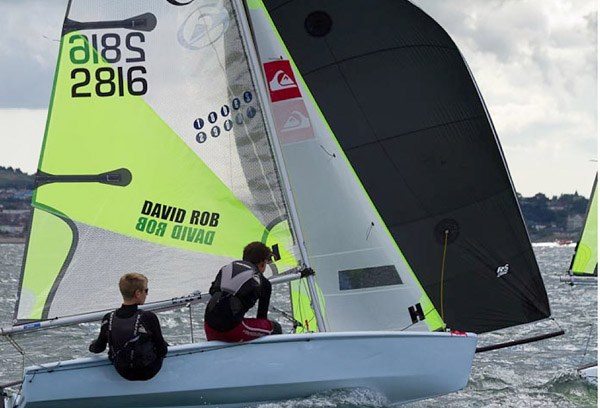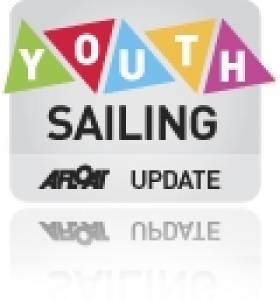Displaying items by tag: RS Feva Irish Nationals
The RS Feva Irish National Championships from 1-3 July attracted 26 entries from Dun Laoghaire, Howth, Malahide, Greystones and the UK to Dublin Bay, writes Stephen Breen.
Three days of racing out of the Royal Irish Yacht Club saw all weather conditions for the 52 sailors, many new to the Feva class — making the championship both challenging and a test of skill and learning.
Day one on Friday 1 July saw three races completed, in varying conditions from zero to 25 knots of breeze — a challenging opening day.
 Tom Flannery with sailing partner Sam in an RIYC charter (centre) look for the edge against the NYC’s Daniel Blake-Hickey Zach Kelly on Cabin Feva (right)
Tom Flannery with sailing partner Sam in an RIYC charter (centre) look for the edge against the NYC’s Daniel Blake-Hickey Zach Kelly on Cabin Feva (right)
The Saturday brought light and variable Dublin Bay conditions and despite numerous attempts to start, no races were finished.
There was patience, persistence and a considerable amount of non-racing fun on and between boats — a glimpse of the benefits of two-handed sailing.
Sunday’s final day saw the 25-knot squalls settle down to a steady 15-20, allowing three solid races and a full result.
An Irish family entry from the UK, the O’Halloran sisters, became convincing Irish National Champions with six bullets and are planning to represent Ireland at the RS Feva Worlds in Weymouth.
 The Royal St George’s Donnacha Sheehy and Arthur Glavin
The Royal St George’s Donnacha Sheehy and Arthur Glavin
Royal St George pair Patrick Foley and Seth Walker came second, while club mates Thea Daly and Ava Ennis came third. The National Yacht Club’s Lizzie and James Hall took the Silver fleet, while the George’s Amelie Hennessy and Molly McGlew took the Bronze fleet.
It seemed to the race officers that fleet separation reduced dramatically throughout — meaning essentially that everyone was a winner, with happy faces and broad smiles all round. Full results can be found below.
If you are interested in purchasing a Feva to join in the fun, Marine Services currently have four in stock with a discount to anyone who has or wishes to compete in the Feva. Contact Heather for more information at [email protected].
Royal Cork Pair Win Feva Irish Title
Strong winds cut short the RS Feva Irish Nationals and Open Championship on Dublin Bay today but before the north-westerly breeze took charge a 58 boat fleet was given a display of top class Feva saiing by visiting Royal Cork Yacht Club crew Brendan Lydon and Marc Cudmore. The pair finished the five race series with four results inside the top three and prevented a pot hunting Royal Yachting Association development squad from walking away with the Irish title.
The RS Feva is now one of Ireland's most popular two-handed intermediate dinghies. Full results from the weekend are downloadable below.

More Feva photo action on the Afloat gallery by Gareth Craig HERE.
























































